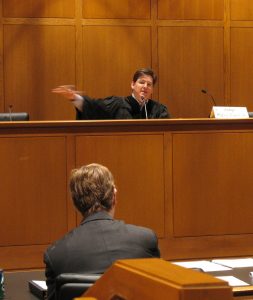The path to due process in our courts is littered with obstacles for pro se litigants, who must overcome lack of knowledge of civil procedure and fear of losing homes, child custody, livelihoods, and other valuable things. They must endure judicial bias and lawyer bullying before they can have justice.
As if that isn’t enough, rules, protocols, and practices, some of which are not in writing, work against them, creating additional obstacles. Pro se litigants can go through an entire case without even knowing that some of these unofficial rules, protocols, and practices even exist. Yet, they must face each obstacle as they go.
Below are a few stumbling blocks to be aware of along the way.
1. Hidden “Rules” as Weapons Against Civil Justice
Lack of knowledge of civil procedure is the main reason lawyers criticize pro se litigants. Yet, the well-prepared pro se litigant knows the rules of civil procedure and is familiar with relevant cases in their jurisdiction. They know courtroom protocol. They’ve studied the case and understand the counts, claims, affirmative defenses, and their elements. Finally, they’re aware of their opponent’s arguments and can address them handily.
What most pro se litigants don’t know are hidden “laws”. They may not be aware of unofficial protocols or notes in the judge’s bullet journal. They didn’t go to law school, so they can’t be expected to know what Professor Hoopencupper at the Medieval Law School said about affirmative defenses or what Judge Pompas held in an ancient landmark case.
When Hidden Rules Don’t Work for Pro Se Litigants
A lawyer will single out an unofficial “rule”, knowing you don’t know anything about it, and let you know, sometimes the night before a hearing, about the rule. They’ll claim that the way your motion or complaint is written is all wrong and contrary to standard practice. The goal is to get a reaction from you, to throw you off your game, or make you lose confidence in your case just before a hearing.
It gets worse when the judge decides to tell you about Professor Hoopencupper and Judge Pompas long after you’ve missed the opportunity to correct whatever egregious “mistake” you made.
How it should work
There are practical reasons for unofficial rules, practices, and protocols. Local rules and practices, for example, are based on the particular court building you’re in, or sometimes even the judge you’re dealing with. They make things go more smoothly in that court. Ideally, they are not used as weapons against pro se litigants but tools to help them better traverse the civil justice system.
2. No Access to Scheduling
Because they are officers of the court, lawyers in many jurisdictions have access to court resources that pro se litigants don’t. One such resource is a judicial scheduling system whereby lawyers can, among other things, schedule and cancel hearings.
When it Doesn’t Work for Pro Se Litigants
When the lawyer has a motion he or she wants heard, s/he will go on the scheduling system, find available dates in the judge’s schedule, and without regard to the pro se litigant, schedule the hearing he or she wants.
This forces the pro se litigant to object to the scheduling of the hearing, move to strike the notice, or adjust their own schedules and lives to make the hearing. All of this takes time and adds to the many challenges of pro se representation. Further, it’s a completely unnecessary and avoidable, lawyer-created problem. It’s lawyer bullying in the face of your right to represent yourself.
How it should work
On the Lawyer’s Motion–The lawyer contacts the pro se litigant to schedule a hearing, and the two coordinate times. The lawyer records the hearing in the system using the agreed upon times.
On the Pro se Litigant’s Motion–The pro se litigant contacts the judge’s JA who provides the litigant with 3 dates and times. Then, the two sides work together to determine the best hearing dates and times amongst the 3. The pro se litigant lets the JA or lawyer know the final day and time, and either the lawyer or JA records the hearing.
The difference between these two approaches highlight whether there is civil justice in the scheduling of hearings, but at least there’s a semblance of fairness.
3. No Attorney Fee Awards
Pro se litigants cannot be awarded attorney’s fees because they’re not attorneys. Right? It makes sense, especially to lawyers.
When It Doesn’t Work for Pro Se Litigants
In this instance too, lawyers have found a way to optimize on an unfair advantage. Particularly in cases where a pro se litigant’s claims or defenses are meritorious, lawyers pull out a bag of tricks. They threaten to go for thousands of dollars in attorney fees if the litigant opposes a particular motion, defends a particular stance, or doesn’t settle for an amount the lawyer likes. These threats are designed to scare pro se litigants and benefit the attorney’s client.
Sometimes, the judge will get in on it too and threaten the pro se litigant with attorney fees. He or she will speak about the attorney’s fees being one of the many reasons one should not represent themselves. Litigation should not be a gamble like this, and judge’s and lawyers who play this game do nothing but make the judicial process cumbersome and untrustworthy.
How it should work
The attorney and the pro se litigant go through a case in which the pro se litigant’s claims and defenses are meritorious and not frivolous or illegal in any way. Given that a pro se litigant has a right to bring a case or defend one, s/he should not then be saddled with paying for an attorney for the other side. Attorney fees should be applied only for claims and defenses that lack merit. At the end of the case, the person who won goes away with a judgment.
Unofficial practices favor represented parties over pro se litigants. That’s unequal treatment, so it’s not justice. But don’t let that trip you up. If there is any attempt to apply civil justice in your case, knowing civil procedure, doing your research, and knowing your own case wins.




For ‘Hidden Rules’, I would suggest identifying these rules as a racket and moving forward with authority, confident in the knowledge that this is rigged and does not stand any scritiny. Thus, the shift here must be mental on the part of the pro se.
The threat of settling the pro se with attorney fees can be daunting – can this be negotiated through an appeal?
I am curious about the financial advantage of pro se – is wearing down a lawyered opponent with lawyer fees a good general strategy that can be executed reliably?